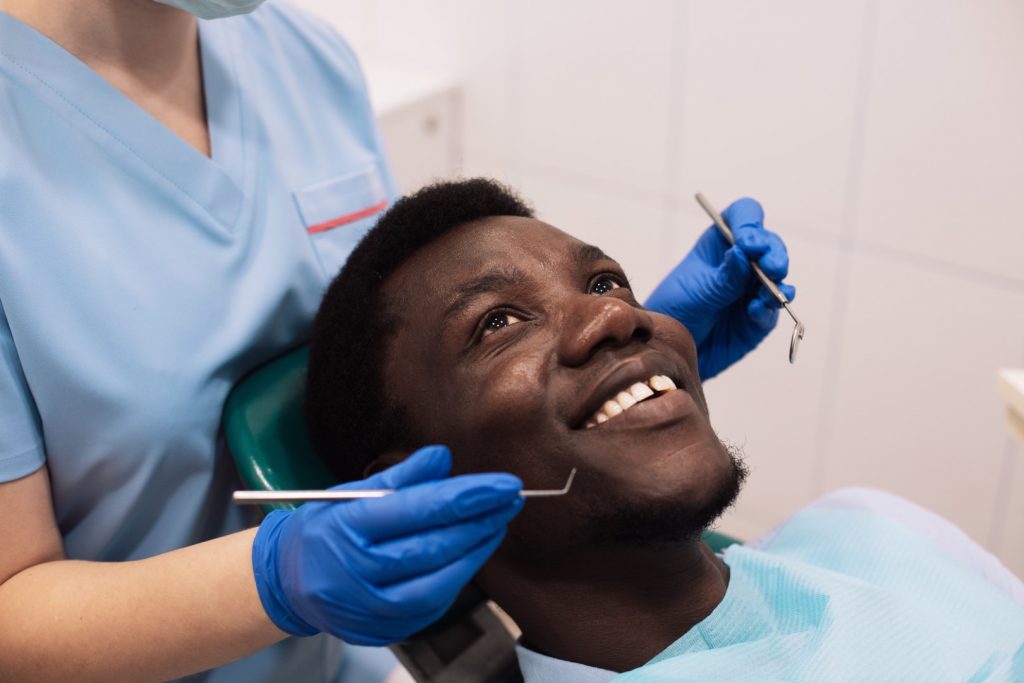Understanding the relationship between nutrition and oral health can help you keep your teeth and gums strong and your smile in great shape. At Penn Dental Medicine at PHMC Public Health Campus on Cedar, we explain the connection between diet and oral health so patients get the most benefit from their treatment.
We also help them appreciate how dental health affects overall health. They’re often surprised at what a difference healthy teeth and gums make to general physical well-being and quality of life.
Good Nutrition Impacts Overall Health and Oral Health
 Good nutrition gives bodies the nutrients, vitamins, and minerals they need to function at their best. A well-balanced diet can help prevent such conditions as obesity, heart disease, and diabetes. It can boost energy levels and improve our overall outlook.
Good nutrition gives bodies the nutrients, vitamins, and minerals they need to function at their best. A well-balanced diet can help prevent such conditions as obesity, heart disease, and diabetes. It can boost energy levels and improve our overall outlook.
Good nutrition is also vital to optimal oral health.
What is the most significant effect of nutrition on teeth and gums? It helps them stay strong, reducing the risk of tooth decay and dental disease.
A healthy diet, rich in vitamins, minerals, and proteins, promotes oral health by providing such nutrients as:
Calcium
Calcium is essential for strong teeth and bones. Calcium deficiencies can weaken enamel, making your teeth more susceptible to decay.
Vitamin C
Vitamin C helps maintain healthy gum tissue. Deficiency in vitamin C can lead to swollen and bleeding gums, and make you more prone to gum disease (periodontal disease).
Phosphorus
Phosphorus works with calcium to build and maintain healthy teeth. This mineral also helps regulate vitamin D, which the body needs to absorb calcium.
Additionally, foods rich in antioxidants benefit oral health. Antioxidants help combat inflammation and protect oral tissues from oxidative stress. Oxidative stress is an imbalance between the body’s production of reactive oxygen species and its ability to detoxify their harmful effects. It can damage cells and tissues, increasing the risk of cavities, gum disease, and oral cancer.
How Poor Nutrition Contributes to Dental and Oral Disease
 How is dental disease related to nutrition?
How is dental disease related to nutrition?
To begin with, one of the biggest culprits in poor oral health is the overconsumption of sugary foods and drinks. When we indulge in sugary treats, oral bacteria produce acids that attack tooth enamel and cause cavities and gingivitis (the earliest stage of gum disease). All these conditions can lead to tooth loss.
Acidic foods and drinks like citrus fruits and carbonated drinks can also harm oral health. They erode enamel, leaving teeth susceptible not only to cavities but also to sensitivity to hot and cold temperatures.
The relationship between nutrition and oral health goes beyond the teeth and gums. Bacteria in the mouth can enter the bloodstream and contribute to inflammation elsewhere in the body. Research links poor oral health to various systemic diseases, including cardiovascular and respiratory diseases.
The Worst Foods and Drinks for Teeth
To reduce your risk of tooth decay, gum disease, and other oral health issues, cut back on sugary and acidic foods and drinks. As much as possible, also avoid:
Sticky and Chewy Foods
These foods’ residue lingers on teeth, forming harmful bacteria.
Carbonated Soft Drinks
Soft drinks are sugary and highly acidic. Carbonation itself can seriously damage tooth enamel.
Sports and Energy Drinks
Though they may contain vitamins, minerals, and electrolytes, sports and energy drinks usually also contain excessive sugar.
Starchy Foods
Starches break down into simple sugars, which are just as dangerous to teeth as regular ones when not cleaned away.
Alcoholic Beverages
The dehydration alcohol can cause leads to dry mouth. Dehydrated mouths can’t produce the saliva needed to wash away food particles and neutralize acid.
The Best Foods and Drinks for Teeth
Here are some of the best foods and drinks for maximizing the connection between good nutrition and oral health:
Dairy Products
Milk, cheese, and yogurt are rich in calcium and contain casein, a protein that helps prevent tooth decay.
Crunchy Fruits and Vegetables
Apples, carrots, celery, and cucumbers contain vitamins and minerals that promote gum health. Also, their crunchy texture stimulates saliva production.
Leafy Greens
Spinach, kale, and other leafy greens are packed with essential vitamins and minerals, including calcium and vitamin C.
Green and Black Teas
Green and black teas are known for their antioxidant properties. They contain polyphenols—chemical compounds that combat inflammation and infection. Drinking tea without sugar or additives also helps promote oral hydration.
Water
Water is vital for oral health and overall health. Drinking plenty of it helps wash away food residue, increase saliva production, and neutralize acid in the mouth.
Nuts and Seeds
Almonds, walnuts, flaxseeds, and chia seeds are excellent sources of vitamins and minerals promoting dental health.
Lean Proteins
Lean proteins like chicken, fish, and eggs contain phosphorus and other essential nutrients for oral health.
PDM at PHMC on Cedar Helps You Stay in the Best Possible Oral Health
 Using the relationship between nutrition and oral health to your advantage is a major way to keep your mouth healthy. Daily brushing and flossing is another.
Using the relationship between nutrition and oral health to your advantage is a major way to keep your mouth healthy. Daily brushing and flossing is another.
However, you can’t ensure your best oral health by yourself.
Regular dental visits help keep your teeth clean. It also allows the earliest possible diagnosis and treatment of tooth decay, gum disease, or other oral health problems.
PDM at PHMC on Cedar is here to help you enjoy a lifetime of healthy smiles and excellent oral health. Schedule your appointment online or call 855-887-9229.






